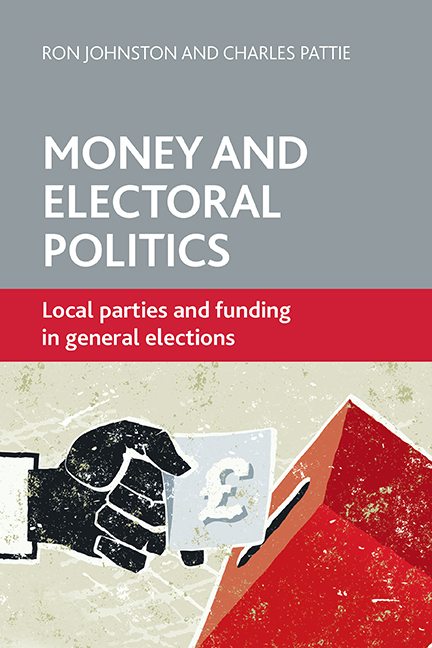Book contents
- Frontmatter
- Contents
- List of tables and figures
- About the authors
- Introduction
- one Follow the money: cash, party and electioneering in Britain
- two Money matters: local campaigns at British general elections
- three The financial health of local parties: the key to electoral success?
- four Raising the money: donations to local parties
- five Party funding futures
- In conclusion
- References
- Index
five - Party funding futures
Published online by Cambridge University Press: 24 February 2022
- Frontmatter
- Contents
- List of tables and figures
- About the authors
- Introduction
- one Follow the money: cash, party and electioneering in Britain
- two Money matters: local campaigns at British general elections
- three The financial health of local parties: the key to electoral success?
- four Raising the money: donations to local parties
- five Party funding futures
- In conclusion
- References
- Index
Summary
The research reported in the preceding chapters has shown that money matters in constituency campaigns at British general elections. Candidates who spend relatively large amounts in the last few months and weeks before election day in general run more intensive campaigns than those who spend relatively little: they contact more voters, display more posters, distribute more leaflets, and have more canvassers working for them on the streets and doorsteps. Not surprisingly, in general more is spent in marginal constituencies either defending narrow majorities or seeking victories where the margin of defeat last time was small. But even within that group of seats there is considerable variation in campaign intensity: some candidates and their local parties are better able to raise money for their campaigns than others in comparable circumstances.
Analysis of local parties’ annual accounts suggests that this variation in campaign intensity reflects the relative health of local parties. Few local Labour parties have an annual income or expenditure exceeding the £25,000 threshold for reporting their financial situation to the Electoral Commission, for example, and although on that measure the Liberal Democrats have more healthy local parties than Labour, compared to the Conservatives their local foundations for conducting intensive local campaigns are also relatively weak across the country. Those local parties with weak finances tend to have fewer members and are unable to attract much money through donations and other fundraising devices (on which see Friedman, 2013). The result is that their candidates’ campaigns tend to lack intensity. This was exemplified by Unlock Democracy's 2006 survey of 286 local parties, the report of which included a section entitled ‘National wealth, local squalor’ (Graham, 2006). At the 2005 General Election, outside the marginal constituencies there was little evidence of direct contact between local parties and electors: ‘at least 67 per cent of the population received no personal contact from any of the three main parties’; and in safe Labour seats this figure was estimated as 82 per cent. (On contact patterns at the 2010 General Election, see Johnston et al, 2012a, 2012b.)
In some respects the lack of local resources has become increasingly irrelevant, as the parties centralise aspects of the local campaigns.
- Type
- Chapter
- Information
- Money and Electoral PoliticsLocal Parties and Funding at General Elections, pp. 151 - 190Publisher: Bristol University PressPrint publication year: 2014



